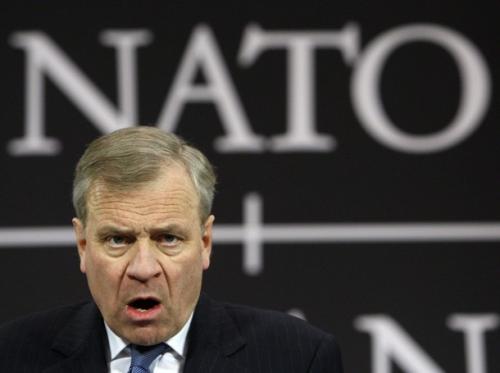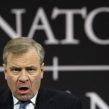
NATO Deliberates on Strategic Concept and Relations with Russia
Publication: Eurasia Daily Monitor Volume: 6 Issue: 38
By:

NATO will hold its 60th anniversary summit from April 2 to 4 on both sides of the Franco-German border. The summit is expected to adopt a basic document on NATO’s Strategic Concept, to be finalized after the anniversary event and replace the existing, decade-old Strategic Concept. The alliance’s secretary general, Jaap de Hoop Scheffer, presented a sketch of the new concept at the meeting of allied defense ministers on February 19 and 20 in Cracow.
The document, not distributed publicly, identifies six salient points, with particular concentration on combating terrorism and related threats and challenges, nuclear proliferation, cyber attacks, climate change (in the context of energy-security policy), and other post-modern threats and challenges (Stratfor, ”A Disappointing Summit," February 20).
Any secretary general must hew close to a common denominator among differing views within NATO on policy issues. This will undoubtedly also be the case with the Strategic Concept at the coming summit. The alliance’s West European tier seems politically and culturally wedded to perceptions of threat that took shape during the preceding decade, mostly linked with non-state, non-military actors and forces. West European governments seem for the most part reluctant to recognize the persistence of conventional military threats and pressures from Russia on neighboring countries and to draw the policy consequences for NATO. A properly updated Strategic Concept, however, would no longer give that type of threat the short shrift. De Hoop Scheffer’s concept outline does at least identify cyber defense as a high priority for NATO, in the wake of the Russian assaults on Estonia’s and Georgia’s internet systems during the 2007 political crisis and the 2008 invasion, respectively.
The Cracow ministerial meeting showed NATO policy toward Russia reverting to business as usual, soon after Russia’s invasion of Georgia (with ongoing militarization of the occupied territories there), suspension of gas deliveries to Europe affecting NATO member countries (in their dual capacity as EU members), and eviction of the U.S.-led coalition from Kyrgyzstan’s Manas air base (critical to allied operations in Afghanistan). Nevertheless, "normalization" with Russia proceeds de facto, without that label but also without a decent interval and on Russian-defined terms. The terms basically involve acceptance of those Russian faits accomplis in the hope that Russia might ultimately deliver on some critical issue (Afghanistan, Iran, energy supplies) for which the West feels dependent on Moscow’s cooperation.
U.S. Defense Secretary Robert Gates repeated in Cracow the idea that it was time to "reset the relationship with Russia and move forward." According to Gates at the press conference, the United States and NATO allies need Russia in too many ways to ignore it (AP, February 19, 20). He named three of the alleged needs for Russian help: eliminating nuclear missile threats from Iran, ensuring continued U.S. and allied access to the Manas base (i.e., reversing the Kyrgyz eviction), and providing overland transit via Russia for U.S. and NATO supplies to their forces in Afghanistan.
Irrespective of their degree of validity, those considerations at least purport to reflect some strategic requirements. By contrast, West European normalization of relations with Russia proceeds as the default option, innocent of strategy, whether by drift or on the basis of bilateral economic and political relations between individual governments and Russia. As a net result, Moscow can well conclude that the onus of "resetting" weighs on the West; that "moving forward" means no consequences for Russian military and energy warfare operations, recent or future ones; and that a constant U.S. and NATO quest for Russian strategic "help" (never yet delivered) places leverage in Russia’s hands against Western interests.
Polish Defense Minister Bohdan Klich cautioned the allied ministers that reverting to business as usual was risky in the absence of a basis for trusting Russia: "The alliance treated Russia as a kind of special partner, intensifying dialogue with it and establishing a special framework for cooperation. That trust has nevertheless been broken," Klich observed (Nasz Dziennik, February 18). With Russia’s invasion of Georgia demonstrating that military aggression remains a possibility, a large group of NATO countries (mainly, but not only, new members) want the upcoming summit to signal a rebalancing of priorities and resources. This could be seen clearly in the position of their delegations at the Cracow ministerial meeting. Without prejudice to continuing expeditionary missions, these countries expect NATO’s upcoming summit, strategic concept, and planning to reflect NATO’s core mission of defending the alliance’s territory.
During the Cracow meeting, Gates and Klich signed a bilateral agreement on U.S. assistance to the development of Polish special operations troops. One hundred Polish special troops serve currently in Afghanistan. The Polish contingent there totals 1,600 and will be maintained at its present strength despite the financial crisis (PAP, February 20, 21).
Meanwhile the comprehensive U.S.-Polish military assistance agreement remains in abeyance, although Poland has already agreed to host the U.S. anti-missile shield on Polish territory. The two agreements are linked to each other, but the new U.S. administration is reconsidering the missile shield project inherited from the Bush administration. In Cracow Gates sidestepped questions about the implementation of these agreements, pending a decision on the missile shield in Washington, which may take time and become negotiable with Russia. For its part Warsaw continues to rely on what Klich called the "solemn U.S. commitment" to deliver the military assistance package to Poland.




